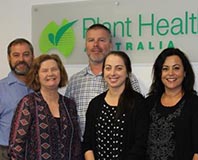Read the latest information on
Foot-and-mouth disease
Grain growers across Australia are fortunate to have access to biosecurity advice specifically for their industry from Grains Farm Biosecurity Officers in each of the main grain growing states. Officers can work one-on-one with growers to explain simple yet effective ways they can reduce the risks posed by pests, weeds and diseases.

Grains Farm Biosecurity Officers. L to R: Jeff Russell, Kym McIntyre, Jim Moran, Rachel Taylor-Hukins and Judy Bellati
The officers work together on the Grains Farm Biosecurity Program which recently underwent an independent review.
The review looked at the changes that were happening within the industry and its broader operating environment and identified ways for the program to evolve so that it can continue to meet the needs of grain growers and the broader industry.
According to Stuart Kearns, manager of Farm Biosecurity Programs at Plant Health Australia, it can be challenging, if not a little overwhelming, for growers to know where to start.
That’s a major reason why the Grains Farm Biosecurity Program was established and why the Biosecurity Manual for Grain Producers was developed.
“The expectation is not that improvements happen overnight. Instead, it’s about getting the ball rolling, a self-assessment checklist – there’s one in the manual – will help you work out where to start. It will also help you to clearly communicate your approach to staff, family and visitors to ensure you have your business in the best possible position should something happen,” Stuart said.
Many people think that biosecurity is something that happens at our ports and airports to keep pests out of Australia, but growers have the most control at their front gate when it comes to keeping out diseases, pests and weeds.
“Identifying possible risks and how they can be best managed within your business can save time and money for grain growers.”
“Unwanted weeds can be brought in with seed and grain – buying certified grain or dealing with trusted sources can greatly reduce the risk.”
“Harvesting contractors and their vehicles can also inadvertently introduce and spread weeds, pests and diseases – a ‘come clean, go clean’ policy can help address that risk.”
“A basic wash down (or blow down) area can be used to reduce the risk posed from contaminated harvesting equipment, and designated parking areas can be easily inspected to help ensure no new weeds are introduced and allowed to spread undetected,” he said.
In other parts of the country where mixed farmers are dealing with an extended dry spell, containment feeding of animals is advised. In addition to the usual benefits of avoiding soil erosion caused by over grazing and the nutritional management of sheep, feeding animals in a contained area using a raised trough of some sort will help to minimise the risks of spreading weed seeds far and wide on your property. When it does eventually rain, and dormant seeds sprout, you’ll have a much smaller area to treat for weeds that were introduced with feed.
“In time, other measures can be introduced and built into the business, which will allow gradual and continual improvement in protecting your farm.”
The Grains Farm Biosecurity Program is an initiative to improve the management of, and preparedness for, biosecurity risks in the grains industry at the farm and industry levels. Launched in 2007, the Grains Farm Biosecurity Program is managed by Plant Health Australia and funded by growers through Grain Producers Australia together with the New South Wales, Queensland, South Australian, Victorian and Western Australian governments.
Biosecurity is an important component of effective farm management. Growers are advised to start with the greatest risks and the most easily implemented management actions.
As Stuart puts it, “Growers have invested too much time, money and effort into their businesses and into their industry to not effectively address biosecurity risks.”
For advice on any aspect of biosecurity, growers should contact their local Grains Biosecurity Officer.
| State | Grains Biosecurity Officer | Phone |
| NSW | Bill Gordon | 0428 133 944 |
| Qld | Kym McIntyre | 0429 727 690 |
| SA | TBA | |
| Vic | Jim Moran | 0418 377 930 |
| WA | Jeff Russell | 0447 851 801 |